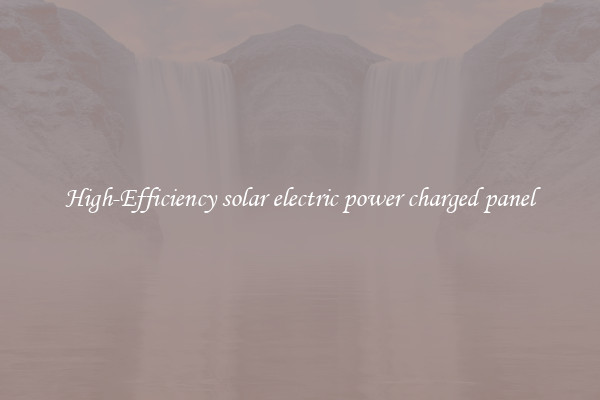High-Efficiency solar electric power charged panel
Taking advantage of renewable energy sources is becoming increasingly important in today's world as we strive to reduce our carbon footprint and combat climate change. One of the most popular and efficient renewable energy sources is solar power, and one of the key technologies driving the adoption of solar power is high-efficiency solar electric power charged panels.

High-efficiency solar panels are designed to convert a greater amount of sunlight into electricity, making them more effective at generating power than traditional solar panels. This increased efficiency means that high-efficiency panels can produce more electricity in a smaller space, making them ideal for residential and commercial installations where space is limited.
One of the key factors that contribute to the higher efficiency of these panels is the use of advanced materials and technologies in their construction. For example, high-efficiency panels often use monocrystalline or polycrystalline silicon cells, which are more efficient at converting sunlight into electricity than older technologies like amorphous silicon cells. In addition, high-efficiency panels may incorporate anti-reflective coatings or back surface reflectors to increase the amount of sunlight that is absorbed and converted into electricity.
High-efficiency solar panels also typically have a higher power output per square foot than traditional panels, which means that fewer panels are needed to generate the same amount of electricity. This can be a significant advantage for installations where space is limited or where aesthetics are a concern.
Another key benefit of high-efficiency solar panels is their ability to generate electricity even in low-light conditions. Traditional solar panels require direct sunlight to generate electricity, but high-efficiency panels can produce power even on cloudy days or in areas with less sunlight. This makes them a more reliable source of renewable energy and can make them a good option for installations in regions with variable weather patterns.
In conclusion, high-efficiency solar electric power charged panels are a key technology driving the adoption of solar power across the globe. Their ability to generate more electricity in less space, their improved performance in low-light conditions, and their use of advanced materials and technologies make them a valuable option for residential, commercial, and industrial solar installations. As we continue to transition to a more sustainable energy future, high-efficiency solar panels will play a vital role in helping us reduce our reliance on fossil fuels and combat climate change.

View details

View details

View details

View details








